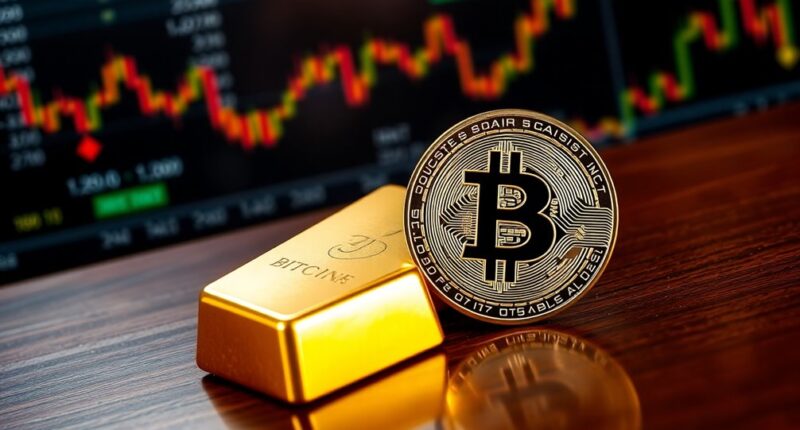Under Trump's trade policies, you're facing a tough decision between gold and Bitcoin. Each asset presents unique advantages and challenges that could impact your investments. Gold is a time-tested refuge during economic instability, while Bitcoin offers the allure of significant returns amid regulatory uncertainty. As tariffs and trade tensions shift, how do you navigate this evolving landscape? The answer might just redefine your investment strategy moving forward.

When it comes to investing, should you choose the stability of gold or the potential growth of Bitcoin? This dilemma can be particularly pressing under Trump's trade policies, which could reshape investment landscapes.
Gold has long been viewed as a stable asset, a reliable hedge against economic uncertainty and inflation. Its track record of retaining value over time makes it a favorite among conservative investors. In contrast, Bitcoin offers the allure of high returns, boasting a staggering 3,700% inflation-adjusted return over the past decade. Additionally, the Bitcoin's capped supply of 21 million tokens adds a unique aspect to its appeal as a scarce digital asset. Furthermore, using a trusted custodian for Bitcoin IRA management can enhance security for your investments.
But with such potential comes volatility; Bitcoin's price swings can test even the most seasoned investors. As Trump's economic strategies unfold, they may affect investor sentiment toward both assets. Many may turn to Bitcoin as a hedge against inflation and dollar devaluation, especially in a landscape marked by tariffs and trade tensions.
However, this potential interest also brings risks, as Bitcoin's regulatory environment continues to evolve. Unlike gold, which operates within a well-established framework, Bitcoin's future remains uncertain, adding another layer of complexity to your investment decision.
If you're leaning toward growth, Bitcoin might catch your eye. Its remarkable performance over the past decade has made it a beacon for those with a higher risk tolerance. Yet, you must weigh this against gold's more modest returns, which typically hover around 30% over a decade.
Gold's stability can provide a safety net during turbulent times, making it an appealing choice for risk-averse investors. Diversifying your portfolio by including both assets can be a smart strategy. This approach allows you to balance potential rewards with risk management.
By combining gold's stability with Bitcoin's growth potential, you can create a more resilient investment strategy. Staying informed about regulatory developments is crucial in the Bitcoin space, as these changes can significantly impact your returns.
Ultimately, the choice between gold and Bitcoin hinges on your investment goals, risk tolerance, and need for liquidity. If you're seeking stability and a hedge against economic downturns, gold may be your best bet.
However, if you're willing to embrace risk for the chance of high returns, Bitcoin could be worth the gamble. Under the current economic climate shaped by Trump's policies, your decision becomes even more critical, as both assets offer unique benefits and challenges.









